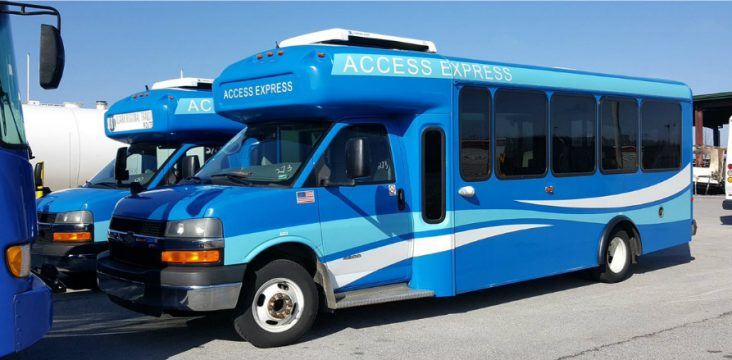Ozark Regional Transit reviews $3.4 million budget, 2% salary increase
by November 29, 2018 6:13 pm 484 views

Board members of Springdale-based transit provider Ozark Regional Transit discussed a 2019 balanced budget of $3.35 million that will include a 2% salary increase for all employees.
ORT employees have received a 2% salary increase annually since 2015. In 2014, it gave a 2.5% increase. Executive Director Joel Gardner explained that the 2% increase was what the proposed budget would allow as the transit provider struggles to remain competitive with wages. The board is expected to vote Dec. 13 on the 2019 budget.
Board members wanted to see a breakdown of employment expenses, to build a reserve fund and to offer more than 2% annually in salary increases.
ORT has a more than 60% driver turnover rate, and of that, 75% leave their position because of wages, said Gardner, adding that between 10% and 15% return to their positions because of the work environment. ORT has a policy allowing former employees who left on good terms to return, and he said this has given the transit provider a competitive edge. Some might leave to drive a rock truck for $5 more per hour or drive an over-the-road coach bus but return because they didn’t like the work.
Board member Don Marr of Fayetteville was concerned about building a reserve in case ORT didn’t receive the expected revenue from charter services. It offers the services on Razorback football game days, and revenue from charter services has risen nearly $3,000 to about $78,000 in 2018, from the previous year. In 2019, ORT is expected to receive $75,000 for charter services, according to the proposed budget.
Another item board members discussed related to the miscellaneous line item as it didn’t include any revenue as it had it the past few years. Mindy Campbell, chief financial officer, said in 2017 the $603,000 largely related to the insurance money from the Jan. 10, 2017, fire. The transit provider expects to have nearly $164,000 in miscellaneous revenue in 2018. Gardner said the revenue often comes from sales of used buses or scrap, which take place throughout the year. Campbell said it was being conservative to not place a number in the miscellaneous line. Marr said he wanted to bring it to the attention of the board when revenue is attributed to the line in 2019 and before it’s spent because of the need to increase funding for wages and build a reserve in case it doesn’t receive the charter services revenue that’s in the budget.
Other highlights of the 2019 budget include insurance costs are expected to rise about $20,000 because of the new buses it will have, and fuel costs should fall by about the same amount as a result of better fuel mileage and fewer miles traveled with the reduction of routes. Gardner said the new buses will receive nearly 7 miles per gallon. Fuel economy for the older buses is about 4 miles per gallon.
On Sept. 14, ORT ordered 12 diesel-powered buses from Creative Bus Sales, and will use a $3.6 million grant from the Federal Transit Administration (FTA) to pay for the buses. The buses are expected to be delivered in March, and with the eight buses the transit provider received in January, it should be able to replace all the buses that were destroyed in the 2017 fire.
Also in September, ORT learned it would receive a $2.9 million FTA grant, and it will use the money to build a 10,000-square-foot administrative office, replacing its existing 4,500-square-foot office. ORT is working to receive proposals from contractors on the project, and a construction contract is expected to be approved in May.
